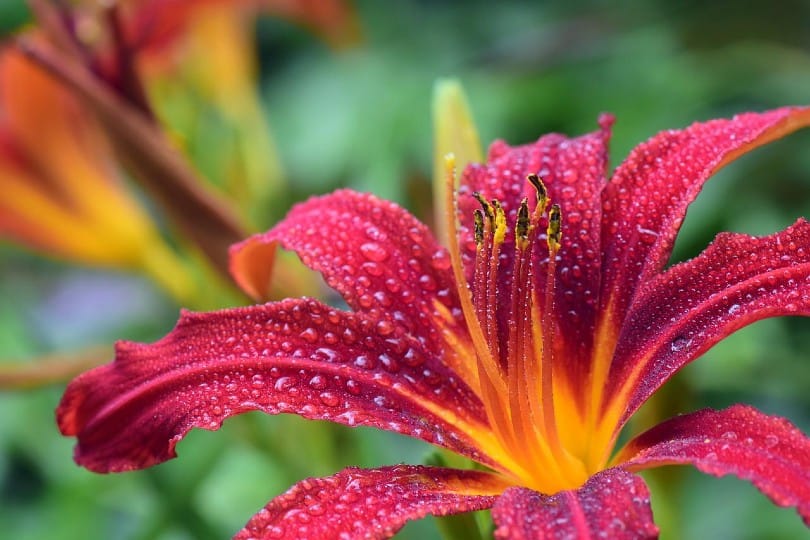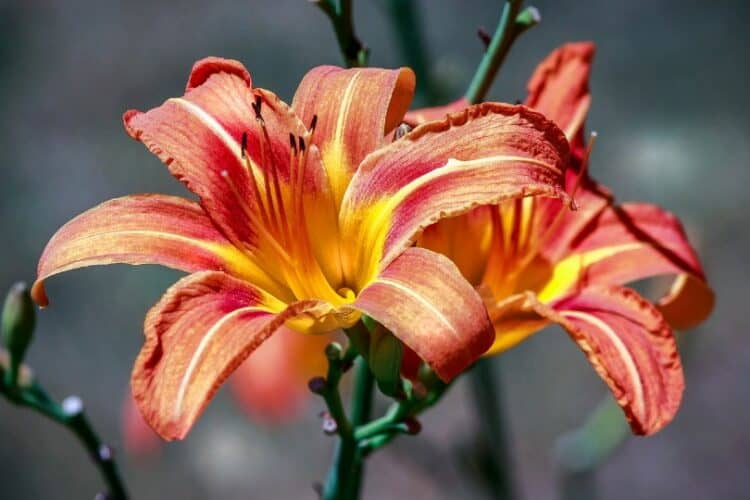Being a “cat parent” means staying abreast of any potential plants, objects, or animals that may potentially harm your cat. This goes for both indoor plants and those grown outside of your home. So, it’s important to know which plants can be toxic to your cat. Some can cause very serious allergic reactions, digestive issues, or even be fatal.
If you have a garden outside your home, you definitely want to do a bit of research on the types of plants and shrubs that are growing in order to keep your cat away from them, if necessary. Daylilies, for example, are one of the most beautiful and popular flowering plants used for home gardens and indoor flower pots. But are these gorgeous houseplants poisonous to cats? And what happens if your cat ingests daylilies? Continue reading to find out.
Are Daylilies Toxic to Cats?
Yes, daylilies are actually pretty toxic to our feline friends. Remember that often, when it comes to vegetation, cats don’t know the difference between good plants and bad ones, they may simply be attracted to the gorgeous flowers and fragrant aromas–just like humans.
So, it’s common for them to wander into your flowering plants or garden and accidentally ingest an entire mouthful of poisonous flowers and stems. And it’s not uncommon for daylilies to cause fatal poisoning in cats.
The poison is actually so toxic that cats can be killed by either eating the lily petals or simply licking the pollen off their kitty paws. And to make things worse, even inhaling some lily varieties can also be extremely dangerous for your cat.

Daylily Varieties That Are The Most Poisonous to Cats
There are over 90 lily species found in the United States. However, there are a handful of ones that are especially toxic to cats. So, if you plan on adding these to your home and you have a cat, it may be best to reconsider. Let’s take a look at some varieties that are particularly harmful to your cat.
Asiatic Lilies
Asiatic lilies are beautifully-colored plants that have trumpet-shaped flowers with large, showy leaves that radiate from a central stem. And unfortunately for cats, they are just as beautiful as they are toxic.
In fact, the pollen is toxic in all parts of the plant. There are cases where the pollen alone has caused acute renal failure (kidney failure) in cats and other animals.
Peace Lilies
Peace lilies are known for their white flame-shaped flowers and large waxy leaves. But they’re a no-go when it comes to cat safety. Both the flowers and stems of these plants are loaded with insoluble oxalates (crystal-shaped toxins).
When cats (or other animals) ingest the flowers, the oxalates cause a lot of irritation to their digestive system. In response to their consumption, you may find your cat vomiting, salivating excessively, or experiencing swelling in its tongue, throat, or entire face.
Lily of the Valley
The distinctive upside-down bell shape of its flowers makes it one of the most sought-after home and garden plants. Their white flowers easily attract cats, dogs, and various wildlife. These lilies aren’t likely to cause any renal damage, but they can still cause severe heart and digestive issues.
Lily of the Valley plants are high in cardenolides (a steroid that’s toxic to animals), which can cause cardiotoxicity. The toxicity levels in this particular Lily variety are off the charts and can cause issues such as heart arrhythmia, lethargy, and vomiting in your cat.

Signs Of Daylily Poisoning In Cats
If your cat is exposed to daylily poisoning, you’ll usually see symptoms start at anywhere between 6 and 13 hours. Initial symptoms may include general lethargy, vomiting, and loss of appetite.
However, these symptoms are known to progress rather quickly, and you may soon find that your cat is disoriented, fainting, or suffering mild seizures. If you do, take your cat to the nearest veterinarian as soon as possible. Note that it’s better to catch the poisoning as soon as possible to treat it, as it will become more difficult as it progresses.
Treatment for Daylily Poisoning in Cats
Treatment for daylily poisoning typically involves inducing vomiting by the use of injected medications or activated charcoal and laxatives to help bind the poison so that it can be removed from the body. The vet may also give your cat fluids for the next 15-20 hours to help slow down potential kidney issues.
If your cat recovers well, be sure to slowly introduce food back to its diet, as it may not have much of an appetite initially. It’s best if the foods are high in nutrients, minerals, and other supplements to help the cat reach its optimal state of health. So, a combination of healthy proteins, carbs (from grains and whole foods), healthy fats, veggies, and fruits is ideal.
Final Thoughts
It’s important to note that poisoning from daylilies isn’t a condition to take lightly. And delaying the treatment can lead to the symptoms exacerbating and possibly becoming fatal for your cat. So, if you plan to plant daylilies in or around your home, be sure to take strict measurements to keep your furry feline friend away from them at all costs.
Featured Image Credit: Pixabay
















